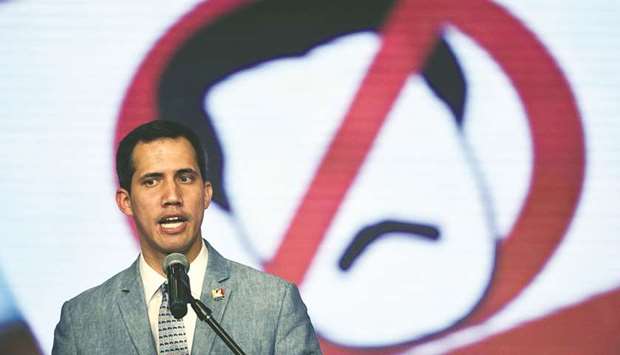Venezuela’s self-proclaimed acting president Juan Guaido has refused to rule out the possibility of authorising United States intervention to help force President Nicolas Maduro from power and alleviate a humanitarian crisis.
National Assembly leader Guaido told AFP he would do “everything that is necessary...to save human lives,” acknowledging that US intervention is “a very controversial subject.”
The opposition leader launched a bid to oust Maduro last month, declaring himself interim president, a move recognised by the US and around 40 other countries, including 20 from the European Union.
Under Maduro’s stewardship, oil-rich Venezuela’s economy has collapsed leaving the country wracked by hyperinflation, recession and shortages of basic necessities such as food and medicine.
“We’re going to do everything that has a lower social cost, that generates governability and stability to deal with the emergency,” said Guaido, 35.
He is trying to bring in food and medicines from the US but the supplies are stuck in warehouses in Colombia because the Venezuelan military has blocked their entry.
Earlier, Maduro vowed not to let in “fake humanitarian aid” and claimed Venezuela’s crisis has been “fabricated by Washington” to justify intervention.
Guaido says 300,000 people could die if desperately-needed aid isn’t brought in.
And he said a first attempt to bring in the aid should be made next week.
“The first stage is containing the sanitation emergency. Two days ago eight children under three lost their lives...dehydrated, malnourished,” said Guaido.
Failing public services including water, electricity and transport are among Venezuela’s worst problems, while there is also a shortage of doctors and medical supplies in hospitals.
Helping the needy is not Guaido’s only aim, though.
He has dismissed Maduro as illegitimate over his re-election last May in polls branded a fraud by the US, EU and many Latin American countries.
Guaido says the constitution allows him to assume power, set up a transitional government and hold new elections — one of his key demands that has received widespread international support.
“We’ll do everything we have to in a sovereign and autonomous manner to achieve an end to the usurpation, a transitional government and free elections,” he said.
And he still has faith that the military can be won over, appealing to their sense of humanity.
“The armed forces have a huge dilemma, whether or not to accept the aid. It would be almost miserable at this point of huge necessity not to accept it,” he said. “Inhibiting the entry of this aid could be seen as a crime against humanity.”
Guaido said the military has to decide whether to “take the side of the constitution” or to “continue on the side of an increasingly isolated dictator.”
But he said “fear” was preventing more top ranking members of the armed forces from switching sides and joining air force general Francisco Yanez who last weekend disavowed Maduro.
“We’ve seen some National Guard sergeants who’ve shown unhappiness and they’re being tortured. One of the sergeants’ relatives is missing.”
Consultants Eurasia Group said on Thursday that Maduro’s traditional allies Russia and China are “unlikely to lend (him) meaningful support,” reinforcing its view that the socialist leader “will be unable to sustain his regime.”
Guaido agrees that no-one will come to Maduro’s rescue.
“I’m not very worried...Maduro hasn’t had a new line of credit since 2016,” said Guaido.
“I’m sure that Moscow as much as Beijing is very aware of the situation in Venezuela, that Maduro doesn’t have popular support, the he can’t stabilise the economy...all the while holding the biggest oil reserves in the world.”

Venezuela self-proclaimed acting president Juan Guaido delivers a speech at the Central University of Venezuela in Caracas.
